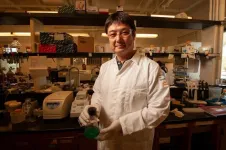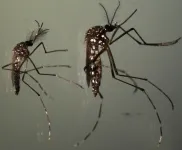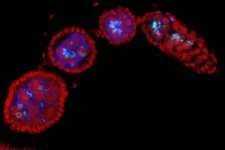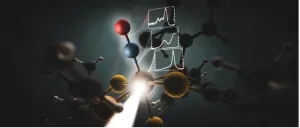(Press-News.org) Scientists at the University of California, Davis, in partnership with the Mars Advanced Research Institute, have announced a significant breakthrough in the production of low-calorie sugar substitutes, such as allulose. This discovery could help address one of the primary obstacles to the widespread adoption of these alternatives: production costs.
Allulose, also known as D-psicose, is a naturally occurring rare sugar that provides a viable alternative to sucrose (table sugar). It has a similar taste, texture and functionality, making it an attractive option for those seeking to reduce their sugar intake. By activating a natural process in a microorganism, researchers have developed a method for high-yield and high-purity production through precise fermentation. This advance has the potential to greatly enhance the affordability and accessibility of these products.
Allulose provides nearly 70% flavor and sweet taste as sucrose, yet it is minimally metabolized as it passes through the body. By incorporating it into food products, individuals can reduce their calorie intake from sugar while still satisfying their desire for sweet flavors. Additionally, allulose has an imperceptible effect on blood glucose and insulin levels.
“Allulose is a great alternative to sugar, but we have not had a cost-effective way to manufacture it,” said Shota Atsumi, professor of chemistry at UC Davis and corresponding author on the paper published Oct. 14 in npj Science of Food. “Our new method is efficient, economically feasible and could be scaled up for commercial production.”
The new approach has a more than 99% theoretical yield with high purity, and therefore only requires minimal processing to isolate the desired product. Current methods of allulose production are normally limited to much lower levels of yield and purity, requiring expensive separation techniques to isolate allulose from the glucose and fructose starting material.
Redirecting existing process
Atsumi, Ph.D. candidate Jayce Taylor, Professor Justin Siegel and a number of co-workers in the Department of Chemistry and from Mars Advanced Research Institute looked for a more efficient way to manufacture allulose. They found an industrial microorganism that has the enzymes to make allulose — it just isn’t using them in that way. They were able to edit the organism’s metabolism to get the cells to convert glucose into allulose. The cells consume all the glucose they are fed and convert it to allulose with a noteworthy concentration, a yield of over 60%, and purity of over 95%, outperforming the existing production methods.
“Once flux was redirected, it turns out the cells have everything they need to do it; they just needed to be turned on and undesired pathways turned off,” Atsumi said.
UC Davis has filed patent applications on the process and modified organisms. Researchers are working with a commercial partner to discuss scaling up the process.
Additional co-authors are Dileep Sai Kumar Palur, Angela Zhang, Jake Gonzales, Augustine Arredondo, Timothy Coulther, Amiruddin Bin Johan Lechner, Elys Rodriguez and Oliver Fiehn at UC Davis; and John Didzbalis, Mars Incorporated, McLean, Virginia.
The work and research by UC Davis were supported and funded by Mars, Incorporated.
END
UC Davis, Mars researchers discover scalable production technique for low-calorie sugar substitute
2023-10-24
ELSE PRESS RELEASES FROM THIS DATE:
Bitcoin mining has “very worrying” impacts on land and water, not only carbon, UN-led study reveals
2023-10-24
American Geophysical Union
24 October 2023
AGU Release No. 23-39
For Immediate Release
This press release and accompanying multimedia are available online at: https://news.agu.org/press-release/bitcoin-mining-has-very-worrying-impacts-on-land-and-water-not-only-carbon/
AGU press contact:
Rebecca Dzombak, news@agu.org (UTC-4 hours)
Contact information for the researchers:
Kaveh Madani, United Nations University, madani@unu.edu (UTC-4 hours)
By the numbers, global bitcoin mining in 2020-2021:
Used 173 terawatt ...
How eggs of the Zika-carrying mosquito survive desiccation
2023-10-24
Eggs of the mosquito that carries Zika virus can tolerate extended desiccation by altering their metabolism, according to a new study publishing October 24th in the open access journal PLOS Biology by Anjana Prasad, Sunil Laxman, and colleagues at the Institute for Stem Cell Science and Regenerative Medicine in Bengaluru, India and the Indian Institute of Technology in Mandi, India. The finding offers potential new ways to control the spread of this mosquito.
Cells are made mostly of water, and desiccation is a potentially fatal event for any organism, since the structures of many proteins and other cellular molecules are dependent ...
How mosquito-controlling bacteria might also enhance insect fertility
2023-10-24
A new study reveals biological mechanisms by which a specific strain of bacteria in the Wolbachia genus might enhance the fertility of the insects it infects—with potentially important implications for mosquito-control strategies. Shelbi Russell of the University of California Santa Cruz, US, and colleagues report these findings in the open access journal PLOS Biology on October 24th.
Different strains of Wolbachia bacteria naturally infect a number of different animals worldwide, such as mosquitos, butterflies, and fruit flies. Wolbachia can manipulate the fertility of their ...
Ancient landscape discovered beneath East Antarctic Ice Sheet
2023-10-24
The research team, led by Durham University, UK, used satellite data and radio-echo sounding techniques to map a 32,000 km2 area of land underneath the vast ice sheet.
They discovered a landscape that appears to have been formed by rivers at least 14 million years ago and possibly even before the initial growth of the East Antarctic ice around 34 million years ago.
This newly discovered landscape consists of ancient valleys and ridges, not dissimilar in size-and-scale to the glacially-modified landscape of North Wales, ...
Cleveland Clinic selected by Wellcome Leap for Two Quantum Computing Research Projects
2023-10-24
Cleveland Clinic has been selected by Wellcome Leap to lead a quantum computing research project, while also playing a significant role in another led by Algorithmiq — both in collaboration with IBM Quantum.
The two contracts were won through Wellcome Leap’s Quantum for Bio Challenge, which will award up to $40 million to 12 researchers globally for research focused on accelerating the development of quantum computing applications for healthcare. Wellcome Leap is a U.S.- based non-profit organization founded by the Wellcome Trust to accelerate and increase ...
SLAC scientists shed light on potential breakthrough biomedical molecule
2023-10-24
Scientists from the Department of Energy’s SLAC National Accelerator Laboratory have gained valuable insights into producing nitroxide, a molecule with potential applications in the biomedical field. While nitric oxide (NO) has long been on researchers' radar for its significant physiological effects, its lesser-known cousin, nitroxide (HNO), has remained largely unexplored.
The study, published recently in the Journal of the American Chemical Society, was born out of a joint endeavor between teams at SLAC’s Linac Coherent Light Source (LCLS) X-ray laser and Stanford ...
Japanese registry finds use of IVUS in coronary interventions reduces mortality and need for coronary bypass surgery
2023-10-24
SAN FRANCISCO – A novel study conducted by a Japanese multicenter registry has revealed the significant benefits of using intravascular ultrasound (IVUS) in coronary intervention procedures. The comprehensive analysis, which focused on enhancing patient outcomes, has provided valuable insights into the effectiveness of IVUS in improving the success rates of these interventions.
The study, titled "Enhancing coronary intervention outcomes with the use of intravascular ultrasound: A comprehensive analysis of long-term benefits in Japanese multicenter registry," sheds light on the positive ...
NIH Kids First program releases nine new data sets for childhood cancer and congenital disorder research
2023-10-24
Philadelphia, PA., October 24, 2023
WHO: The Gabriella Miller Kids First Pediatric Research Program (Kids First), an initiative of the National Institutes of Health (NIH)
WHAT: Kids First announces the release of nine robust new pediatric research datasets spanning childhood cancers, congenital disorders, and cross-condition data. New publicly available datasets include:
PEDIATRIC CROSS-CONDITION
Kids First and INCLUDE: Down Syndrome, Heart Defects, and Acute Lymphoblastic Leukemia
Principal ...
Case report shows promising results using transcranial magnetic stimulation for post-stroke ataxia
2023-10-24
In a new case report, researchers at UCLA Health describe promising results using repetitive transcranial magnetic stimulation (rTMS) in the management of post-stroke cerebellar ataxia, a debilitating condition marked by impaired coordination and balance.
Cerebellar ataxia describes a group of neurological disorders that affect coordination, balance, and control of muscle movements. It results from damage or dysfunction of the cerebellum, a part of the brain responsible for coordinating voluntary movements. Ataxia can manifest as unsteady walking, difficulties with fine motor skills, and problems with speech, ...
$9 million award from the Department of Defense will fund groundbreaking FutureG research
2023-10-24
Lingjia Liu, professor of electrical and computer engineering who is also an inaugural faculty member at the Virginia Tech Innovation Campus, has been awarded the Mobile Distributed Multiple-Input, Multiple-Output (Mobile dMIMO) project by the U.S. Department of Defense’s (DoD’s) Office of the Under Secretary of Defense for Research and Engineering (OUSD(R&E)) as part of its flagship FutureG program. The Mobile dMIMO project consists of three phases, with $9 million total planned funding — $1.5 million is for Phase 1 of the project. The Mobile dMIMO project represents one ...







